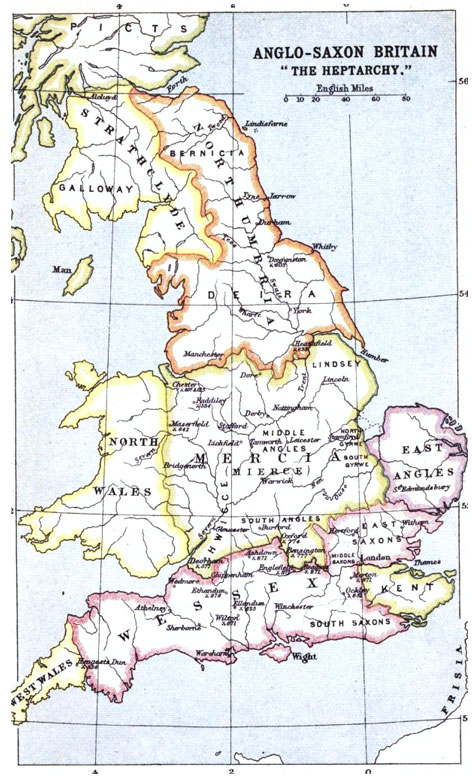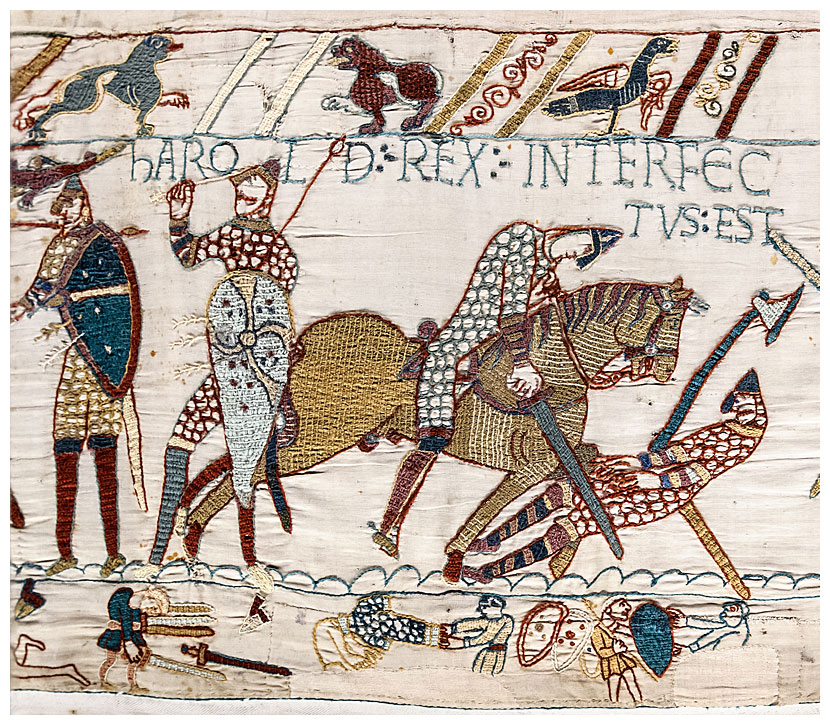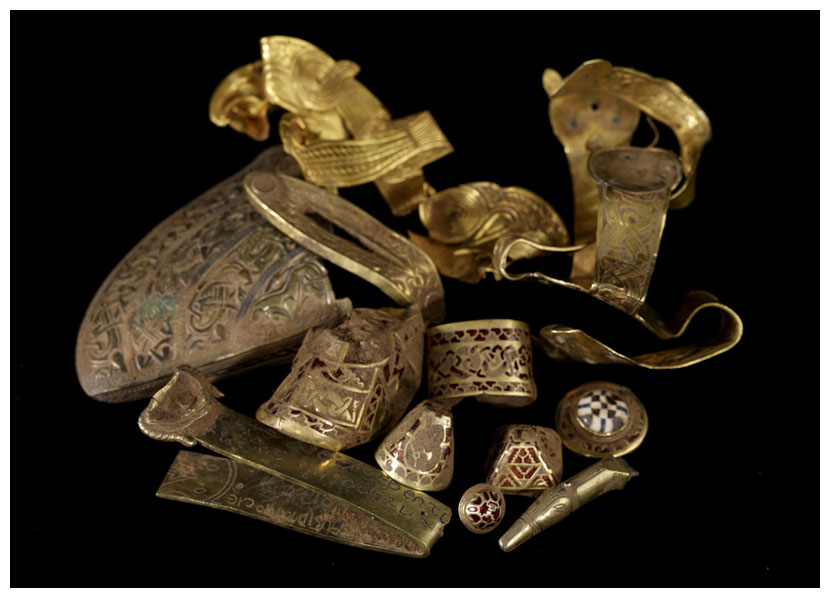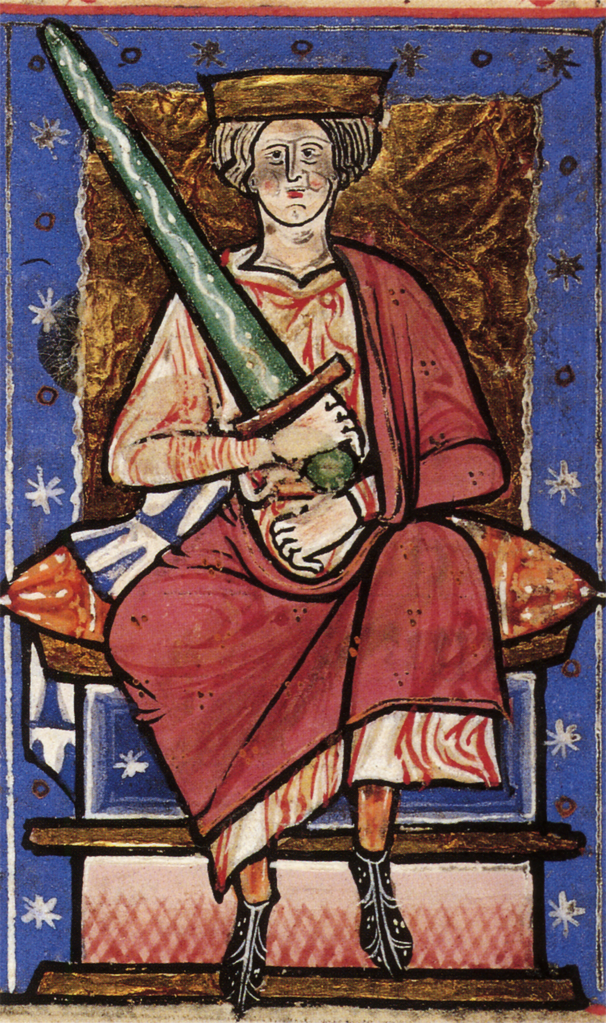Anglo-Saxon England was no Dark Age but a Medieval “Wild West”
By Philippa Grafton
History Answers
Martin Wall, author of The Anglo-Saxon Age: The Birth of England and new book The Anglo-Saxons in 100 Facts reveals why everything we thought we knew about the “Dark Ages” is almost certainly wrong. In fact we know a hell of a lot about this incredible vibrant period in British history…
Where exactly did the Anglo-Saxons come from?
In his famous Ecclesiastical History of the English People the Northumbrian monk, Bede, known as ‘the father of English history’ identified three German tribes which were the ancestors of the English peoples. The Saxons were from north Germany, between the Rivers Elbe and Weser. They were fearsome warriors and their name comes from the short stabbing knife which all free men carried, the seax.
The Angles came from Angeln on the borders of Germany and Denmark, modern-day Schleswig-Holstein. Another south Scandinavian Germanic tribe, the Jutes, were the third tribe Bede mentions. Their history is more contested, because they were a restless people who moved about from place to place, and some historians think that they and the Angles had established colonies along the coast of the modern day Netherlands. Here they interbred with the local Frisian people, and many Frisians were involved in the emigration to Britain. Almost certainly there were smaller groups of Franks, Batavians and possibly Goths who joined in the expeditions.
All these peoples shared a language which was virtually identical, and a culture of militaristic piracy and sea-faring. Their gods and their laws and their military methods were almost identical too. But they were exceptionally protective of their tribal independence and their own royal dynasties, with no concept of a common strategy as such. Under pressures generated by climate-change and the consolidation of the Hunnic Empire just east of their original homelands they began to emigrate by sea. The political vacuum in Britannia following the departure of the Roman imperial apparatus and the military presented tempting opportunities for these pagan tribes, which they soon took advantage of.

The major Anglo-Saxon Kingdoms of England, according to Bartholomew’s A Literary & Historical Atlas of Europe (1914)
Was there a military campaign involved or was it a case of integrating with the Britons?
This is a very important and interesting question. In recent times, there has been a marked attempt to undermine the conflict-oriented perspective promulgated by earlier historians, based largely on archaeological evidence which does not seem to confirm the story of a bloody, violent invasion which happened over a short period. There had been Germanic elements in the British population for some centuries before the Anglo-Saxons arrived. The Roman authorities hired German soldiers, and eventually moved entire tribes, all over the empire. Ironically, they were here to defend Britain originally. Almost certainly, some of these soldiers had interbred with native Romano-British women wherever they were stationed. The real threat to Roman Britain had always been the Picts from the highlands of modern Scotland, and the Scots, an Irish tribe.
In 367 these peoples broke through Hadrian’s Wall and ransacked all of southern Britain. Saxons and Franks took advantage of the chaos and raided along the east and south coasts. Our best witness, although he was not exactly contemporary with events, is a British monk called Gildas. He states that a British leader called a Superbus Tyrannus or overlord invited the Anglo-Saxon tribes into Britain to act as a defence against the Picts.
Bede calls this man ‘Vortigern’ and he may have been a son-in-law of the Roman Emperor Magnus Maximus. Vortigern failed to keep up with the payments of tribute and food-renders he had agreed with the Saxons, and they burst out of their small enclaves and pillaged the whole of southern Britain. This sounds like a campaign of sorts, designed to terrorise the Romano-British population and drive them out. Many Britons fled overseas to Armorica (still called ‘Brittany’ today) and to ‘Britonia’ in Spain. These would have been the wealthiest, best educated Britons. The Britons fought back, and eventually a great battle called Mons Badonicus was fought and the Britons won.
For 50 years there was an uneasy truce, but eventually the Anglo-Saxons resumed their expansion, until by the seventh century they occupied most of what we call England today. There were many Britons in the south and east who became tenants of English lords. They were known to the Anglo-Saxons as Wealisc or ‘Welsh’ – ‘foreigners’. They had lower social status, possibly little better than slavery. Gradually they would have adopted Anglo-Saxon dress, speech, and may even have reverted to paganism. So, a short answer is, there were many military campaigns, for hundreds of years, though some Britons ‘integrated’ but as a conquered people.
How did the Anglo-Saxons revolutionise Britain?
The most obvious initial effect of the Anglo-Saxon influx was the obliteration of the Roman legacy, not so much a ‘revolution’ as a regression, a turning away from ‘civilisation’. There was one crucial difference between the Anglo-Saxons and the other ‘barbarian’ peoples which overran Western Europe; they were heathens, whereas the Goths and Vandals and Franks were Christians, heretical Christians true, but still amenable to Roman achievements and innovations.
The Anglo-Saxons had no time for Christianity at first, and through their kings they were connected to heroic and warlike Nordic gods such as Woden and Thor, very much like the later Vikings, whose heritage they shared. Cities were thought of as cursed evil places, and emptied of their population they were simply left to decay. The huge palatial villas were ransacked and left in ruins.
The Anglo-Saxons were somewhat analogous to the pioneers of the American ‘Wild West’, pushing forward in small tribal groups and establishing small-holdings and farms, under the protection of fierce warrior kings. It took some hundreds of years before the Anglo-Saxons converted to Christianity, but once they converted they became devout Christians. Their missionaries converted the Germans and Frisians, and Northumbria became one of the most important centres of learning and art in Europe. In their life-or-death struggle against the Vikings, the Anglo-Saxons gradually united as one people – the English. England became the first developed nation state in Europe, with a fearsome military, guarding one of the wealthiest kingdoms in Christendom. Ironically, it was this very success which made them vulnerable to conquest, first by the Danes, then the Normans.

The death of King Harold at the Battle of Hastings
What kind of edge did the Normans have when they invaded in 1066?
The Normans were the most fearsome military power in Europe in 1066. Although Normandy was only a small duchy, the aristocracy there were descendants of Vikings who had been granted lands there by the French king, and they had adopted the French language and crucially, the Roman Catholic faith. The Vikings, of course, were famous warriors and adventurers, bred to war from childhood. But the Normans had copied another innovation from the French, the chevalier or mounted armoured knight.
These men were like the ‘tanks’ of their day, designed to smash through and pursue enemy infantry. The horses were specially bred in designated parks, and trained to kick and bite. A few hundred Norman knights, in the service of the Pope, had managed to conquer Calabria and Sicily in Italy and set themselves up as kings, a few years before 1066. The Normans also knew how to build invulnerable defensive positions on dominating heights called castles, from which they could terrorise and subdue the local population.
Exceptionally devout, the Normans were confident that they were doing God’s work, in the finest traditions of chivalry. Above all they were arrogant, ruthless, callous and cruel overlords, who looked down on the conquered ‘Englishry’ and ‘Welshry’ as inferior beings. It was this supreme confidence in their destiny which made them so audacious and ambitious.
How exactly do you condense the period into 100 Facts?
It wasn’t easy! I had the advantage of having written another book The Anglo-Saxon Age: The Birth of England for Amberley, and so I had a good store of useful information. The ‘100 Facts’ is not a recapitulation of the previous book, but it does follow a similar chronological sequence, which helps to order the facts. I wanted the book to present a broad rounded picture of the Anglo-Saxon way of life, but not to lose sight of the supreme importance for these people of the concept of monarchy. In this series the publishers are trying to strike a balance, so that obscure, amusing and quirky events break-up the heavier more serious stuff! Nevertheless, despite the obvious constraints, I hope it is a good overview, conveying how crucial the Anglo-Saxons were to laying the foundations of our modern world.

Fragments of Anglo-Saxon metalwork from the Staffordshire Hoard
On the flip side, how is there even enough information for 100 facts? How do we know all that we know about the Anglo-Saxons?
A great boon to students of this period is The Anglo-Saxon Chronicle, several versions of which exist, which was a continuous record of important events from the first landings in the fifth century right up to the Norman Conquest and beyond. Although the early Anglo-Saxons were illiterate, they preserved their history through employing scops and story-tellers whose task it was to preserve the royal lineages mnemonically.
These dynastic lineages and the many battles and campaigns by which the Anglo-Saxon kings had extended their power were written down by monks. One such monk, Bede, wrote an ecclesiastical history, the object of which was to promote an Englisc national ‘identity’. Although Bede had his own regional bias (he was Northumbrian) and an ‘agenda’ or sorts, he really was an intellectual giant, to stand beside any of the philosophers of any age. These important sources are even today our very best evidence, packed full of important and sometimes strange information.
I have read much of the most important extant modern scholarship too, and my favourite academic guide is Sir Frank Stenton’s Anglo-Saxon England in the Oxford History of England series. I have a special interest (some would say a regional bias!) in ancient Mercia, and the fascinating discovery of the Staffordshire Hoard near to where I live has given me an opportunity to ‘re-instate’ the Mercian contribution to the formation of England. There is plenty of excellent information out there!
What’s new about The Anglo-Saxons in 100 Facts? What kind of approach have you taken to explaining such an obscure period of history?
Perhaps the ‘new’ thing is that I take the view that we shouldn’t mystify the period by calling it ‘obscure’? My view is that for many years the school curriculum was deliberately devised with the conscious intention of consigning the Anglo-Saxons to oblivion, inhabitants of some shadowy ‘Dark Age’, somehow inferior, barbaric. For many of us ‘history’ at school commenced in 1066!
A great revelation, as I have said, was the Staffordshire Hoard, and the Sutton Hoo discovery before it. Such exquisite art and skilled craftsmanship cannot be hidden, and they speak to us of a culture which was as sophisticated as our own, whose imagination was perhaps superior in some sense. The process of explaining the period I used was to imagine myself as in some sense in the tradition of Anglo-Saxon and English historians like Aethelweard and Layamon.
These contemplatives retired to the banks of the River Severn, where Aethelweard wrote down a history called a Chronicon and Layamon his Brut. The river represented to them the flow of time, and the preservation of the folk-history of the people was a sacred duty, performed on behalf of the people. I hope in some small way, I am doing similar work.

Ethelred ‘the Unready’ from The National Portrait Gallery History of the Kings and Queens of England by David Williamson
You’ve written extensively about the Anglo-Saxons – what is it that keeps you hooked?
I have lived in many places in England with strong Anglo-Saxon and Anglo-Danish influences, but it was when I returned to my Mercian roots that influences which I had perhaps subconsciously absorbed in childhood re-emerged strongly. I am by no means alone in this – JRR Tolkien was immersed in the particularly ‘Anglo-Saxon’ emotional atmosphere of the region, for example.
As a very small boy, my primary school were taken to see a surprisingly lavish production of Beowulf the most famous story in early Anglo-Saxon literature. I am not exclusively interested in the Anglo-Saxons. For me the real interest is in their relations with the Celtic Britons and the Vikings and then, finally, the Normans. It was the constant warfare between these peoples which produced an extraordinary cross-fertilisation of cultural ideas which eventually led on to the ‘British Empire’ – but that is all in my next book!
Do you have a favourite Anglo-Saxon monarch, and what is the reasoning behind it?
I do! Without doubt my favourite is Ethelred ‘the Unready’. This may seem like a controversial choice, but I am a writer, and Ethelred is a gold-mine for any writer. His long (38 years in all) reign was an utter catastrophe for England. His sobriquet, unraed means ‘no-counsel’, or ‘poor counsel’ a pun on his real name Aethelraed ‘noble counsel’. In fact, as I point out in the book, he was more ‘unlucky’ than ‘unready’. The incredible ‘roller-coaster ride’ of his reign could not be made up! I am not alone in thinking this.
In Elizabethan times an anonymous play was written called Edmund Ironside or War Hath Made All Friends which covered the incredible and dramatic events of Ethelred’s downfall. Many experts have speculated that it may be the first work of a budding playwright called William Shakespeare. If any Hollywood producers are interested, do get in touch!
To you, what’s the most remarkable thing to have come out of the Anglo-Saxon period?
There are two things which stand out for me. One is the remarkable survival of the royal house of Wessex. The sister of Edgar ‘the Aetheling’ the last credible alternative to William, the Norman conqueror of England – married into the Scottish royal dynasty. Eventually their daughter married Henry I, William’s fourth son, and so our present monarch is a direct descendant of Alfred the Great, and possibly Cerdic, the first West Saxon king in the fifth century!
But another, possibly more important legacy, is the English language, which despite being relegated to the speech of a conquered race, despised and denigrated by the ruling Norman elite – went on to become one of the most widely spoken languages in the world, with a peerless literature, eagerly studied by people all around the world.
Do you have anything in the pipeline?
Indeed I do! I have been working on my next book, Warriors and Kings: The 1500 Year Battle for Celtic Britain also published by Amberley Books. This extends the chronological range of my researches, and develops my interest in the mythical and folk-history of Britain as a whole – hopefully out later in the year!
Latest News
 Warriors and Kings: The 1500-Year Battle for Celtic Britain – An Interview with Martin Wall19th July 2024 - 12:22 pm
Warriors and Kings: The 1500-Year Battle for Celtic Britain – An Interview with Martin Wall19th July 2024 - 12:22 pm ‘West: Tales of the Lost Lands’ review in Country Life Magazine16th March 2023 - 12:33 pm
‘West: Tales of the Lost Lands’ review in Country Life Magazine16th March 2023 - 12:33 pm Author Martin Wall is interviewed by Charles Christian on The Weird Tales Radio Show22nd December 2019 - 1:52 pm
Author Martin Wall is interviewed by Charles Christian on The Weird Tales Radio Show22nd December 2019 - 1:52 pm Robert Plant sings his praises for Kinver author’s magic book16th September 2019 - 5:55 pm
Robert Plant sings his praises for Kinver author’s magic book16th September 2019 - 5:55 pm Listen – Martin is interviewed by Paul Ross on Talk Radio24th June 2019 - 5:54 pm
Listen – Martin is interviewed by Paul Ross on Talk Radio24th June 2019 - 5:54 pm
Books by Martin Wall
 West: Tales of the Lost Lands by Martin Wall9th November 2022 - 1:43 pm
West: Tales of the Lost Lands by Martin Wall9th November 2022 - 1:43 pm The Lost Battlefields of Britain by Martin Wall16th February 2022 - 4:31 pm
The Lost Battlefields of Britain by Martin Wall16th February 2022 - 4:31 pm The Magical History of Britain by Martin Wall19th September 2019 - 4:38 pm
The Magical History of Britain by Martin Wall19th September 2019 - 4:38 pm Warriors and Kings, The 1500-Year Battle For Celtic Britain by Martin Wall1st June 2017 - 1:06 pm
Warriors and Kings, The 1500-Year Battle For Celtic Britain by Martin Wall1st June 2017 - 1:06 pm The Anglo-Saxons in 100 Facts by Martin Wall15th June 2016 - 4:22 pm
The Anglo-Saxons in 100 Facts by Martin Wall15th June 2016 - 4:22 pm
Upcoming Events
 Bewdley Festival of the Arts19th July 2024 - 12:39 pm
Bewdley Festival of the Arts19th July 2024 - 12:39 pm


